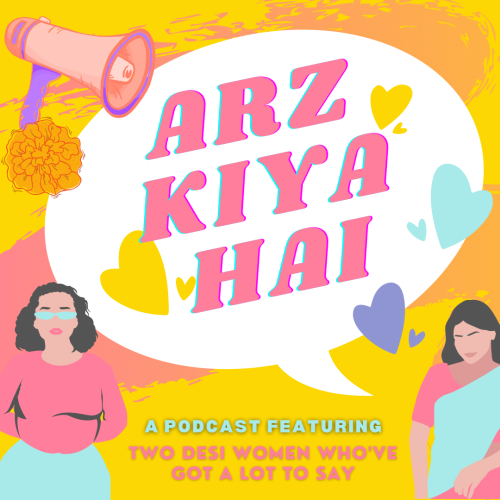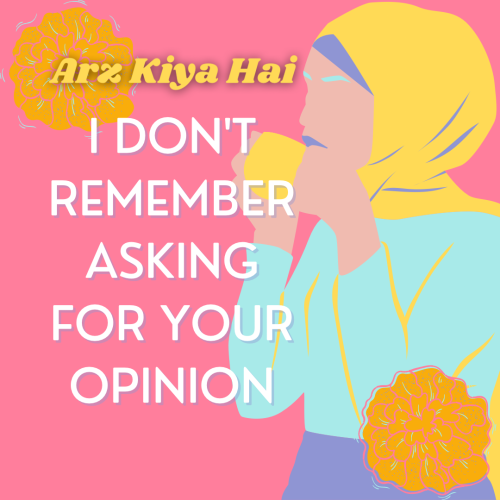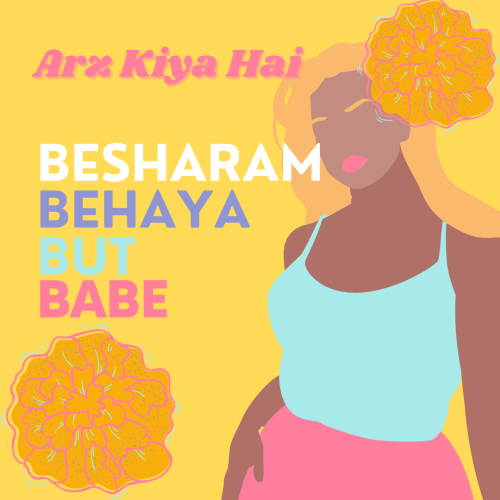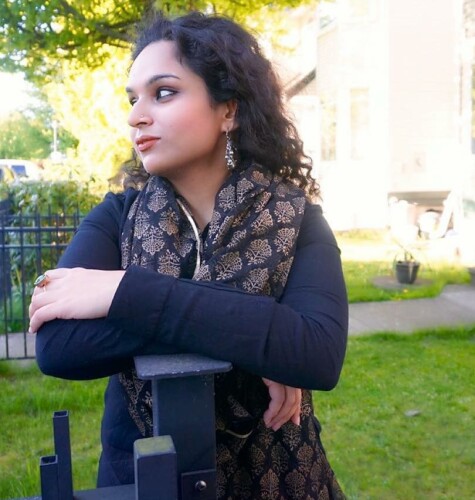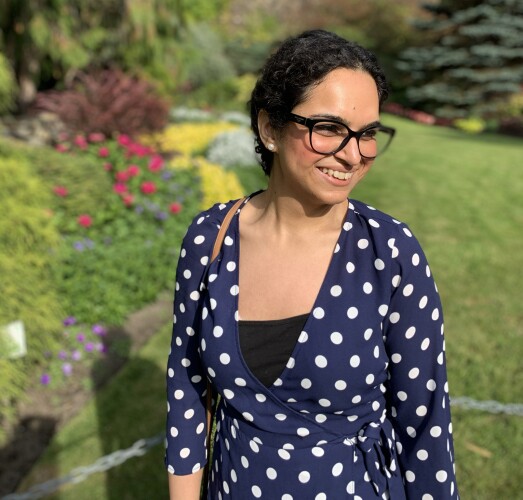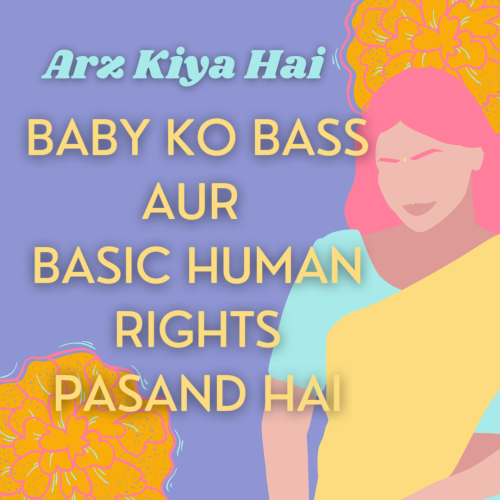
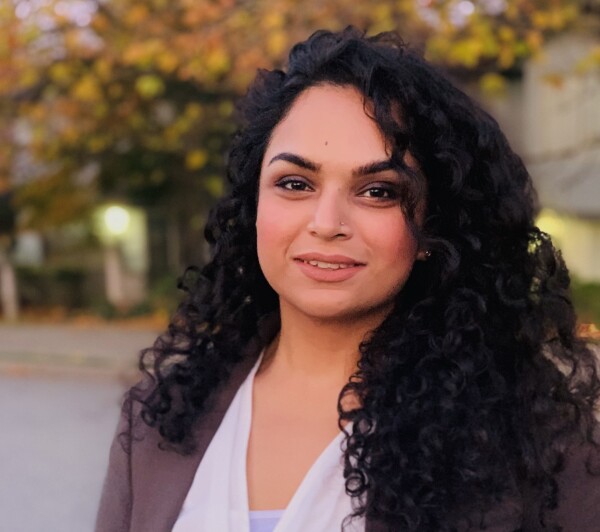
Talia is a dedicated intersectional feminist and a wholehearted desi woman who is on a mission to redefine the narrative of desi womanhood. Her passion for gender equality and social justice has driven her to continuously apply herself professionally, culturally, and socially to amplify the voices of women and marginalized populations. Talia works in consulting as a social development practitioner where she works with communities to bring forward the voices of those who have been structurally oppressed and removed from the community development processes. Outside of work, Talia is also a community organizer bringing together the desi diaspora in creative and liberal spaces to discuss and engage with identity formation and cultural exploration. And most recently, Talia co-launched a desi woman focused podcast called “Arz Kiya Hai” with her fellow feminist badass co-host Mehr-un-Nisa Mohsin.
Tell us about your journey?
For as long as I can remember I have been deeply passionate about gender equality. I grew up in Pakistan where I closely witnessed women of all socio-economic backgrounds struggle to access opportunities and resources they need to live safe, healthy, and meaningful lives. I began making sense of the world when Benazir Bhutto was Prime Minister and that really shaped my worldview of women and I believed women could be anything they wanted to be. However as I gained more awareness I realized that women, especially desi women, face countless barriers that keep them from living life on their own terms.
My cultural identity is also very important to me and I am extremely proud to be a desi. However after immigrating to Canada as a teenager, I once again witnessed that regardless of living in a more socially progressive society, immigrant women were still oppressed and expected to fit into predetermined boxes. Desi women are expected to be docile, compassionate, polite, domesticated – so, perfect to work in the care economy as homemakers, nurses, teachers, childcare workers, etc. I fully recognize these careers are essential, and as we found out during the pandemic largely women dominated occupations comprise our frontline workers. However this narrative is limiting and further contributes to biases that adversely impacts women who are seeking to progress in other fields in business, medicine, media, engineering, sports, science, politics, or, finance. During the pandemic there has been an alarming rise in injustices against women who have faced higher rates of violence, job losses, and are disproportionately taking the burden of care work while facing higher risk of contracting the virus.
This is why I decided to launch the Arz Kiya Hai to start a discussion among the desi diaspora community to challenge the narrative of womanhood that we have been spoonfed for centuries. As Muslim, desi women, Mehru and I recognize that we are situated in a highly conservative society and people become defensive when we start talking about social oppression and women’s liberation. So we knew we wanted to present these topics in a way that would be engaging and intellectually accessible to diverse desi audiences. We have designed our podcasts to reflect “living room” conversations where we use our lived experience and everyday language to shed light on the multiple forms of oppressions and patrolling subjected to women.
What is the hardest challenge you have come up against in your personal/professional life?
Growing up I did not have very many female role models or mentors who I could lean on to seek guidance and make sense of my ambitions. Role models and mentors are critical for personal and professional growth as they can help you break free from social, political, economic, and mental barriers. There have been so many things I have had to learn on my own and it took a long time. However my struggle has also taught me to believe in myself and hold compassion for myself. I also have a strong sense of self worth because I know that regardless of the challenge I can figure out a way out of it.
What advice would you give young South Asian women wanting to do what you do?
I would say regardless of what ANYONE says hold on to your sense of self and your dreams. Then make sure you do not compromise for any reason on achieving your dreams. If you don’t have a network already, then go out and actively seek women who you can relate to and who inspire you. This could be your mother, aunty, coworker, friend, friend’s mom, or cousin. Leverage social media as it is can be an extremely transformative space. Personally, I think I was able to shed so many fears and break free of barriers from the learnings I got from desi women bloggers. And if you can’t figure something out, just google it.
What do you do to help South Asian women/non-binary individuals feel empowered?
I believe that as women we have a duty to stand in solidarity with each other and amplify the voices of women and non-binary individuals who are seeking to create a difference. As women we have to recognize we are in struggle against centuries of oppression and violence subjected to women. We cannot have social justice until women and non-binary people have equality in all aspects of life and are free to live healthy lives, free of violence and constraints.
Being part of this movement does not mean you have to necessarily demonstrate or start a podcast. This resistance can begin in your homes where you challenge your parents, relatives, and friends when they say misogynists, sexist, and transphobic statements. You can use your own social media to express solidarity and support for demonstrations, political movements, contribute to discussions, and donate to organizations. We also have to recognize that class gives us a certain privilege and with this privilege comes a responsibility to not further oppress other women who are not privileged. For me this means that I use my platform and resources to support women who are on their personal growth journey through providing them a safe space to share and also challenge them to self reflect and push past their own barriers.
If you could tell your teenage self something, what would it be?
Stop explaining yourself and seeking validation. You don’t have to please everyone; just do your thing.
What is your personal motto or mission statement?
I want to leave this planet knowing that I played my part to the best of my ability to create a more socially just world.
Besides your work, what are you passionate about?
Dance and theatre. Through dance and acting I am able to express myself and become in touch with my soul, free of any societal expectations.
Where can one find you on your days off?
I am a bit of a workaholic as I am deeply passionate about what I do. I enjoy applying myself in some way or the other which can be working on a client deliverable, researching, developing art for Arz Kiya Hai, recording podcasts, painting, or before the pandemic having a desi dance party with my friends. I am also addicted to listening to political podcasts, I have them on repeat.
How do you balance work, life, family?
I am still learning how to do this. I have a demanding career and I also have a significant number of care responsibilities at home. However my relationships matter a lot to me so I try my best to make time for my loved ones. This means I have to look after my health first, so having a daily routine in which I take time out to eat healthy, practice yoga and dance helps me remain sane and grounded.
Are there any upcoming events or projects you would like our audience to know about?
Stay tuned for some super exciting and fun episodes on the Arz Kiya Hai podcasts. We will be bringing fun guests and continue having badass women-centric conversations as we burst desi stereotypes one episode at a time.
Stay connected with Talia
- Instagram: @talia.times
- Podcast – IG: @arzkiyahaipodcast YouTube: Arz Kiya Hai
